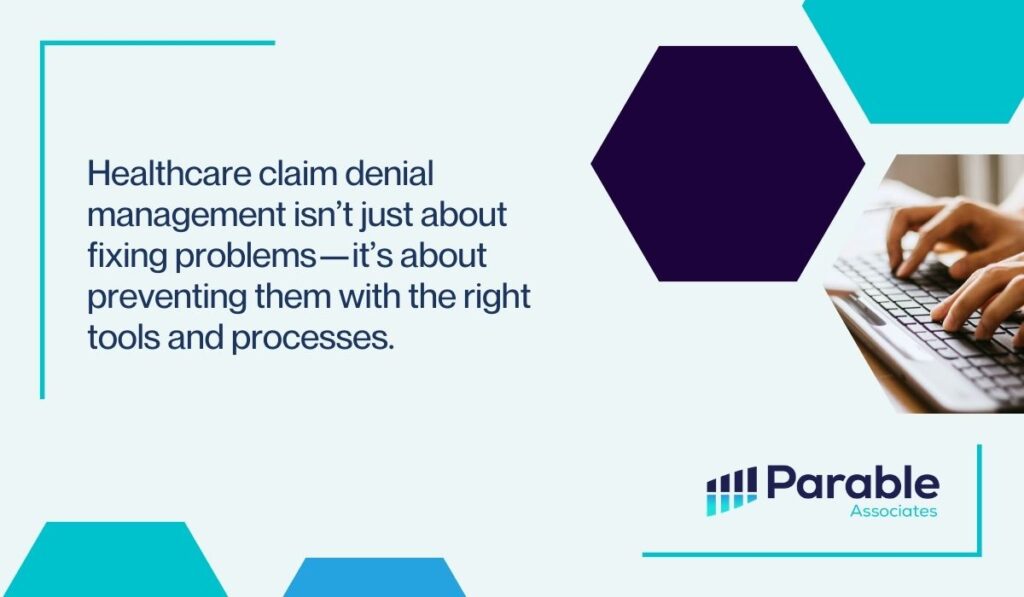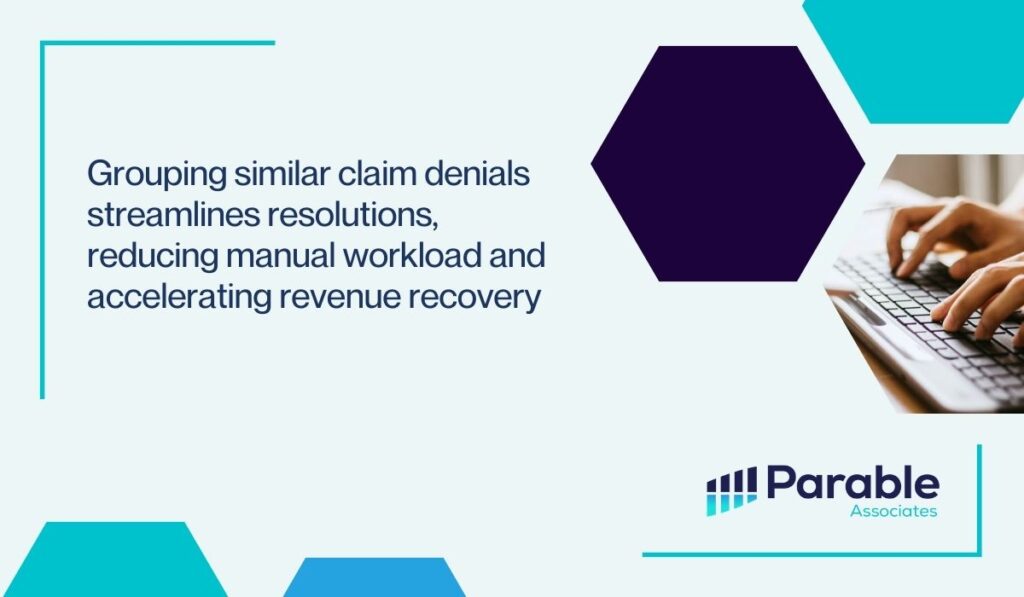Healthcare claim denial management is a growing challenge for medical practices. A recent article in Medical Economics cited a survey that reported 73% of providers say claim denials are increasing, compared to 42% in 2022. The survey also found 38% of providers experience claim denials at least 10% of the time. Additionally, 11% of providers report that more than 15% of their claims are denied. This leads to major disruptions in cash flow, increased administrative workload, and additional time spent on rework. For many healthcare facilities, claim denials are treated reactively—addressed one at a time without a clear strategy. Without structured processes in place, practices risk revenue loss and inefficiencies that can significantly impact operations.
To ensure financial stability and streamline workflows, healthcare facility administrators and practice managers must adopt a proactive approach to claim denial management. Larger healthcare organizations have already started leveraging data-driven strategies to reduce denials and optimize reimbursement. The good news is that smaller practices can implement similar techniques without massive infrastructure investments. This blog will provide three key strategies to improve your claim denial management process, reduce administrative burdens, and maximize revenue.

1. Understanding The Impact of Claim Denials
This is the first step facility administrators and practice managers must take to improve claim denial management.
Why You Should Care
Denials are more than just temporary setbacks—they cause ripple effects across the entire practice. Delayed payments, revenue losses, and increased workload on billing teams create operational bottlenecks that slow down the entire revenue cycle. Without a proper claim denial management strategy, practices can struggle to keep up with appeals, leading to even greater financial strain.
Common Pain Points
Many healthcare practices fall into one or more of these common pitfalls:
- Lack of tracking and reporting: Many practices do not generate regular reports on denials, relying instead on manually resolving claims one at a time. This reactive approach makes it difficult to identify recurring problems.
- No clear workflow for appeals: Without a structured process, claims get lost in the shuffle, leading to missed deadlines for reconsiderations and extra work that consumes valuable staff time.
- Staff overwhelmed by volume: Administrative teams often deal with hundreds of individual denials but lack the resources to manage them effectively, leading to backlogs and overlooked claims.
- Lack of standardization: Different payers have unique denial codes and processes, making it difficult for staff to handle each case efficiently.

2. Implementing a Data-Driven Approach to Denial Management
This approach is key to overcoming healthcare denial management challenges.
What Others Are Doing Right
Larger healthcare organizations have invested in data warehousing and reporting tools such as Power BI or Tableau. Microsoft Power BI provides interactive dashboards, real-time analytics, and seamless integration with Microsoft products. Tableau is a robust data visualization and analytics platform known for its intuitive interface and strong integration capabilities. These tools allow them to be proactive and address issues before they result in denials.
Identify Denial Trends and Group Similar Claims Together
- Why it matters: Many healthcare practices handle denials one at a time, which is inefficient and time-consuming. By analyzing denial trends and grouping similar claims, staff can resolve multiple claims in bulk rather than treating each one as a separate issue.
- How it helps reduce denials:
- Allows staff to create batch correction workflows for claims with the same denial reason (e.g., missing authorization, incorrect coding).
- Helps prioritize high-impact denials, such as those with the biggest financial impact or the shortest time before the appeal deadline.
- Enables targeted training and process improvements by revealing systemic issues with documentation, coding, or billing workflows.
Example: If a practice notices a pattern of denials due to incorrect modifier usage, they can address the root cause by adjusting internal coding guidelines, preventing future denials of this type.
Spot Common Payer Rejections and Adjust Submissions to Prevent Denials
- Why it matters: Different payers have different claim processing rules, and denials often result from minor discrepancies in how claims are submitted. If practices can identify common payer-specific rejections, errors can be corrected before claims are submitted, reducing rework and appeals.
- How it helps reduce denials:
- Enables the creation of payer-specific billing rules to prevent submission errors.
- Ensures claims are pre-screened for errors, such as missing required fields or incorrect coding before they are sent to payers.
- Helps implement real-time alerts in the billing system to flag potential denials before submission.
Example: If a payer frequently rejects claims for a specific service when prior authorization is missing, the practice can integrate automatic checks into their billing system to flag these claims before submission.
Improve Accuracy and Reduce Preventable Denials
- Why it matters: Many denials are avoidable and stem from common errors like missing information, incorrect coding, or eligibility issues. Enhancing claim accuracy before submission leads to fewer denials and a smoother revenue cycle.
- How it helps reduce denials:
- Reduces the burden of appeals and rework, allowing staff to focus on patient care instead of administrative corrections.
- Improves first-pass claim acceptance rates, leading to faster reimbursement and improved cash flow.
- Provides data-driven insights to refine staff training and internal billing processes.
Example: By implementing a pre-submission accuracy review and automated claim validation tool, a practice can see a significant drop in denials related to incorrect patient demographics and missing authorization codes.
How You Can Do It Too
Even without advanced data infrastructure, healthcare facilities can leverage existing reporting tools to implement a more effective denial management strategy:
- Use your standard Clearinghouse or Practice Management reporting tools: Most practice management software and clearinghouses include some level of reporting. While it may not be fully customized, it is a strong starting point for tracking trends.
- Monitor and analyze common claim denial reasons: By identifying patterns, you can implement corrective measures such as missing modifiers or incorrect coding.
- Integrate reports into your workflows: Instead of dealing with denials one by one, generate regular reports that allow you to tackle similar denials in batches, saving time and effort.
Many practices fail to utilize the full reporting potential of their systems. By reviewing what reporting capabilities exist within your practice management software, you can build structured denial management processes around them.

3. Organizing and Tracking Denials for Faster Resolutions
A critical step in improving healthcare claim denial management is categorizing denials effectively.
Mapping Denials Effectively
Many healthcare providers struggle with tracking claim denials, making it difficult to monitor progress. Without a structured approach, staff may spend too much time sorting through denials manually, delaying resolutions.
A best practice is to map denials using standardized coding systems, including:
- CARC (Claim Adjustment Reason Codes): These codes indicate why a claim was adjusted or denied (e.g., missing information, incorrect modifier, duplicate claim, etc.).
- RARC (Remittance Advice Remark Codes): These provide additional explanations regarding the denial or adjustment.
By grouping denials into specific categories, practices can:
- Identify which payers have the most common issues and take proactive steps to correct them.
- Assign claims to billing staff based on category, payer, or urgency.
- Prioritize high-impact denials (e.g., those affecting major revenue sources) to minimize financial damage.
Using Practice Management Tools for Denial Tracking
Many practice management (PM) systems include built-in tagging, notes, or comment features that can be used to track denied claims efficiently. This ensures that claims aren’t forgotten and allows teams to monitor progress through the appeal process.
Best practices include:
- Using internal notes to document the status of each denied claim (e.g., “Sent for reconsideration – awaiting payer response”).
- Tagging claims based on urgency to prioritize follow-ups effectively.
- Setting up alerts or reminders for appeal deadlines to prevent claims from being written off due to missed filing windows.
By implementing a structured tracking system, healthcare facilities can prevent claims from being lost, ensure timely follow-ups, and improve the overall appeal process.

Effective Healthcare Claim Denial Management
Denial management is complex, and even the most organized practice can struggle to keep up with payer changes, documentation requirements, and appeal timelines. Fixing these processes early can prevent long-term revenue loss and operational inefficiencies.
For healthcare organizations looking for expert guidance, Parable Associates specializes in healthcare claim denial management. Our data-driven approach helps practices:
- Identify the root causes of denials and implement corrective strategies.
- Optimize workflow automation to prevent recurring denials.
- Improve reimbursement rates and ensure faster payments.
If your practice is struggling with claim denials, it’s time to implement a strategic approach that minimizes financial risk. By working with an experienced partner like Parable Associates, you can streamline your revenue cycle, reduce administrative burdens, and enhance financial stability.
Contact us today to discuss how our customized solutions can help you take control of your denial management process and accelerate your revenue cycle.
Healthcare Claim Denial Management FAQs
Healthcare claim denial management refers to the process of tracking, analyzing, and resolving denied claims to ensure healthcare providers receive proper reimbursement. It involves identifying denial trends, improving claim accuracy, and implementing proactive strategies to reduce preventable denials.
Claim denials are on the rise due to stricter payer requirements, coding errors, missing documentation, and changes in reimbursement policies. Many practices struggle to keep up with evolving regulations, leading to higher rejection rates and revenue loss.
Some of the top reasons for claim denials include:
Missing or incorrect patient information
Lack of prior authorization
Non-covered services
Coding errors or mismatched diagnosis codes
Duplicate claim submissions
Failure to meet timely filing deadlines
By analyzing denial trends and grouping similar claims, practices can process denials in batches rather than individually. This approach helps teams work more efficiently, identify recurring issues, and implement targeted solutions to prevent future denials.
Healthcare providers can reduce payer-specific denials by:
Understanding each payer’s claim processing rules
Implementing pre-submission validation tools
Creating payer-specific billing guidelines
Monitoring denial reports to adjust workflows before submission
Data analytics helps healthcare organizations track claim denial patterns, pinpoint high-risk areas, and optimize billing processes. Tools like Power BI and Tableau provide real-time dashboards that enable proactive decision-making to reduce denials and improve cash flow.
Even without advanced data infrastructure, practices can leverage built-in reporting features in their practice management (PM) systems or clearinghouses. Tracking common denial reasons, using notes to monitor appeals, and analyzing reports can help identify and correct recurring issues.
Practices should implement a structured denial tracking system by:
Categorizing denials using standardized CARC and RARC codes
Assigning denials to billing staff based on urgency and type
Using PM software to tag, comment, and monitor claims through the appeal process
If a denied claim is not appealed within the payer’s deadline, the provider forfeits the opportunity for reimbursement. This can result in lost revenue and increased write-offs, making it crucial to have a timely appeal process in place.
Parable Associates provides data-driven claim denial management solutions that help practices:
Identify root causes of denials
Implement workflow automation to reduce errors
Optimize reimbursement processes to accelerate payments
By partnering with Parable Associates, healthcare organizations can streamline revenue cycles, reduce administrative burdens, and enhance financial stability.

